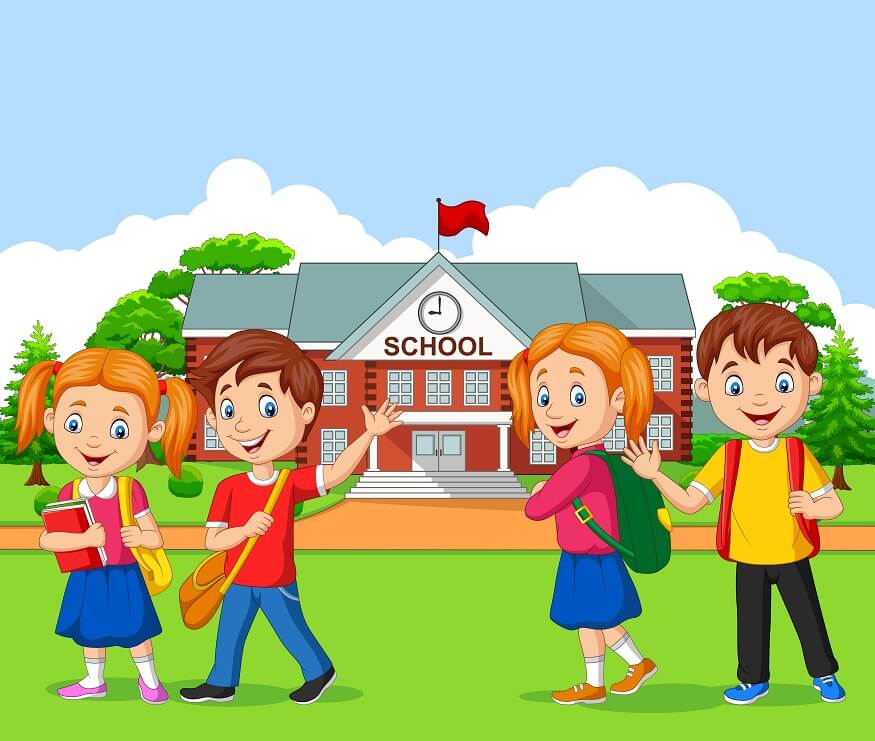Primary and secondary education have significant differences when it comes to the age group, subjects taught as well as the objective and depth of knowledge gained at each level of education. A typical educational journey in India can be broadly classified into the following stages:
Classification of Educational Stages in India
Pre-Primary Stage
- Typical Age group – 3 to 6 years
- Levels of Classes – Pre-Nursery, Nursery, KG, LKG and UKG
Primary Stage
- Typical Age group – 6 to 12 years
- Levels of Classes – Classes 1st to 5th
Middle Stage
- Typical Age group – 12 to 14 years
- Levels of Classes – Classes 5th to 8th
Secondary Stage
- Typical Age group – 14 to 16 years
- Levels of Classes – Classes 8th to 10th
Senior Secondary Stage
- Typical Age group – 16 to 18 years
- Levels of Classes – Classes 11th to 12th
Undergraduate Stage
- Typical Duration: 3-4 years
- Example Courses: Bachelor of Technology, Bachelor of Commerce
Postgraduate Stage
- Typical Duration: 2-3 years
- Example Courses: Master of Technology, MBA
There are further stages such as doctoral and post-doctoral education which can be pursued beyond post-graduation.
In this blog, however, we will focus on the objectives and broad course coverage in primary and secondary education. To make it simpler, we will consider the pre-primary, primary and middle stages under the Primary School Education category and the secondary and senior secondary stages under the Secondary School Education category to effectively highlight the difference between primary and secondary education.
Also Read: Understanding Curriculums: Pre-primary, Primary, Secondary
Primary School Education
Primary school education forms the formative years of students where their basic cognitive and motor skill development is the key area of focus. The key objective at this stage is to expose children to a diverse set of experiences which engage their cognitive, motor and basic communication abilities. The pre-primary stage is largely covered by private schools. Primary school education is offered by the government free of cost in most states along with a large presence of private institutions as well.
A wide variety of subjects such as:
- Languages – Reading and writing in English, Hindi, and other local languages
- Social Studies (History, Geography, Political Science or Civics)
- Mathematics
- Science
- Environmental Science
- Creative Arts
- Personal Development
- Health and Physical Education
From the list above, it is evident that the focus of primary education is to provide formative experiences to young minds. The languages are taught to enable children to effectively communicate with others in society. English is usually taught as a compulsory language along with an option to choose Hindi or any other language depending on the state boards. They learn to identify objects by their names. They learn how to pronounce words and formulate sentences when communicating with others. These skills in their formative stage of primary school education are extremely critical in ensuring that children emerge as effective communicators when they grow up.
We as humans are meant to be social animals and hence, a significant portion of our existence depends on how we engage with society. To develop strong social skills, children need to understand the constructs of our society during primary school education. This objective is achieved through social studies subjects such as History, Geography, and Political Science. History talks about the evolution of our civilization and our ancestral linkages. It helps us understand our roots and the origin of our culture better. Geography tells the children more about the physical features of our earth, and the atmosphere we live in. It helps children understand our engagement with nature and our environment better. One of the end objectives of social studies is to develop children into good samaritans and aware citizens. Political science and Civics as a subject teach children about how our governance structure works and our rights and duties as a citizen.
Mathematics and sciences work on the cognitive development of young minds. Problem-solving is introduced to develop basic analytical and critical thinking skills among primary school children. General Sciences are taught in primary school education to give exposure to children to the functioning of our physical and natural world. To know how plants, human beings and animals function. How the environment and nature work. All these questions build a sense of curiosity among primary school children. Once they have their answers, they start to appreciate the simplicity and complexity of the universe they live in.
Towards the later stages of primary education, classes 6th to 8th, children are encouraged to start engaging in vocational fields. The purpose of offering these optional skill-based courses is to begin to orient children to start exploring what careers could interest them in the future.
The skill subjects offered by the department of skill education for classes 6th to 8th are as follows:
- Artificial Intelligence
- Beauty & Wellness
- Design Thinking
- Financial Literacy
- Handicrafts
- Information Technology
- Marketing/ Commercial Application
- Mass Media
- Travel & Tourism
In short, primary school education works towards creating holistic and aware citizens who are ready to take up the next stage and make their specific contributions to society.
Also Read: The Right Age for LKG Admission
Secondary School Education
Once the children are exposed to various aspects during primary school education, it is time to build some degree of specialised focus and skills. This is the key objective of secondary school education. Between primary and secondary education, it is the secondary school education where career critical choices are made, such as which board to choose ICSE or CBSE, which stream to opt for, Medical, Non-medical, arts or commerce, etc. Some of these decisions could be extremely critical and hence the initial years of secondary education, classes 6th to 10th, is where children are given basic exposure to all the streams. The typical subjects taught during classes 8th to 10th are:
Compulsory subjects:
- Two Languages – English, Hindi, or a regional
- Mathematics
- Social Sciences
- Science
Optional subjects
- Skill subject
- A 3rd language or any other academic subject
- Health and Physical Education
- Work Experience
Following suit from the skill subjects in primary school education, there comes a slight focus during secondary school education. The skill subjects offered by the department of skill education for classes 9th to 10th are as follows:
- Employability skills
- Retail
- Information Technology
- Security
- Automotive
- Financial Markets
- Tourism
- Beauty and Wellness
- Agriculture and Food Production
- Front Office Operations
- Banking and Insurance
- Marketing and Sales
- Healthcare
- Apparels
- Multi-Media
- Artificial Intelligence
- Physical Activity Trainer
- Data Science
- Electronics and Hardware
The main difference between primary and secondary education is, secondary school education begins to narrow the focus of children towards a possible career of their choice. Students who like mathematics begin to gravitate towards a career in engineering while those who align more with the arts look to pursue post-graduation courses in Arts. Students with a keen interest in business would take the commerce route while those interested in Biology would pursue the medical route. Hence, secondary education is a critical stage in deciding the possible future career a child might begin to pursue.
At EuroSchool, we have a firm hold on the complete development cycle of our students right through primary and secondary school education. This combination leads to a smooth transition from primary to secondary education. Get in touch with us to know more about the difference between primary and secondary education and how our curriculum ensures that the key objectives of primary and secondary education are well met.









